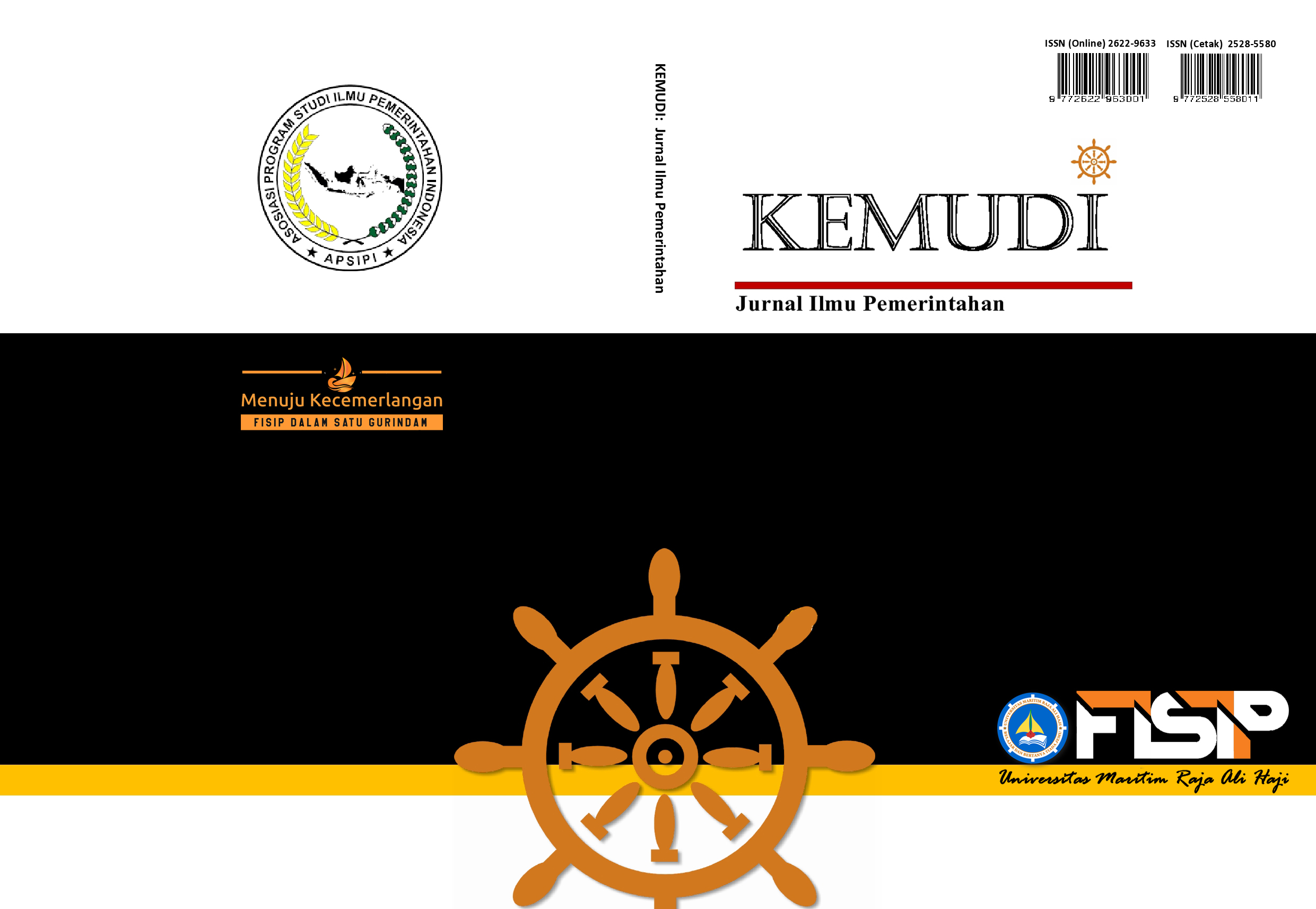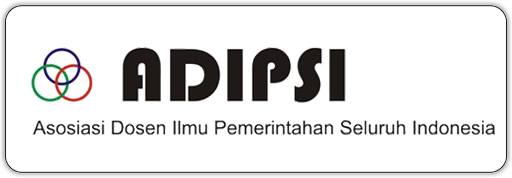Village Government Challenges Facing Technological Advances: Readiness for the digital era in Bengkalis Village, Riau Province, Indonesia
DOI:
https://doi.org/10.31629/kemudi.v8i2.6643Keywords:
Readiness, Village, DigitalizationAbstract
This study aims to analyse the readiness of the village government in facing the digitalisation era seen from various aspects to analyse the problems and obstacles of the village government in facing the digitalisation era. The method used is descriptive qualitative to explore in depth empirical phenomena. The results showed that the village government in Bengkalis Regency was not ready to face the digitalisation era from the aspect of human resources, the knowledge and skills of village officials were still low in mastering technology and information and the readiness of technological infrastructure that had not been able to support the digitalisation era, namely the uneven internet network in all villages. The conclusion of this research is that the village government in Bengkalis Regency does not have qualified readiness in facing the digitalisation era.
Downloads
References
Aceto, G., Persico, V., & Pescapé, A. (2019). A survey on information and communication technologies for industry 4.0: State-of-the-art, taxonomies, perspectives, and challenges. IEEE Communications Surveys & Tutorials, 21(4), 3467–3501.
AlBar, A. M., & Hoque, M. R. (2019). Factors affecting the adoption of information and communication technology in small and medium enterprises: A perspective from rural Saudi Arabia. Information Technology for Development, 25(4), 715–738.
Alfiansyah Halomoan Siregar, A. H. S., Irman Hermadi, I. H., & Sri Wahjuni, S. W. (2019). Evaluation Of Infrastructure Readiness In Supporting The Implementation Of E-Government Using The Cobit 5 Framework. Case Study: Padangsidimpuan City Government. Jurnal Sistem Informasi (Journal of Information System), 15(1), 28–36.
Amani, F., & Halmawati, H. (2022). Pengaruh Partisipasi Anggaran dan Komitmen Organisasi terhadap Kinerja Manajerial pada Perhotelan di Kota Padang. Jurnal Eksplorasi Akuntansi, 4(2), 299–310.
Andrew, D. P. S., Pedersen, P. M., & McEvoy, C. D. (2019). Research methods and design in sport management. Human Kinetics.
Aspers, P., & Corte, U. (2019). What is qualitative in qualitative research. Qualitative Sociology, 42, 139–160.
Bashori, B. (2020). Konsep kepemimpinan abad 21 dalam pengembangan lembaga pendidikan tinggi islam. PRODU: Prokurasi Edukasi Jurnal Manajemen Pendidikan Islam, 1(2).
Bergström, D., Norberg, C., & Nordlund, M. (2022). “Words are picked up along the way”–Swedish EFL teachers’ conceptualizations of vocabulary knowledge and learning. Language Awareness, 31(4), 393–409.
Bizimana, S. C. (2020). E-government Readiness Assessment for Government institutions in Burundi. Development, 3, 4.
Chatterjee, S., Moody, G., Lowry, P. B., Chakraborty, S., & Hardin, A. (2020). Information Technology and organizational innovation: Harmonious information technology affordance and courage-based actualization. The Journal of Strategic Information Systems, 29(1), 101596.
Döringer, S. (2021). ‘The problem-centred expert interview’. Combining qualitative interviewing approaches for investigating implicit expert knowledge. International Journal of Social Research Methodology, 24(3), 265–278.
Dwivedi, Y. K., Kshetri, N., Hughes, L., Slade, E. L., Jeyaraj, A., Kar, A. K., Baabdullah, A. M., Koohang, A., Raghavan, V., & Ahuja, M. (2023). “So what if ChatGPT wrote it?” Multidisciplinary perspectives on opportunities, challenges and implications of generative conversational AI for research, practice and policy. International Journal of Information Management, 71, 102642.
Erniyanti, E., & Syaputra, R. (2023). Fungsi Yuridis Lembaga Kemasyarakatan Di Daerah. CV. Gita Lentera.
Garcia-Arroyo, J., & Osca, A. (2021). Big data contributions to human resource management: a systematic review. The International Journal of Human Resource Management, 32(20), 4337–4362.
García-Peñalvo, F. J. (2021). Avoiding the dark side of digital transformation in teaching. An institutional reference framework for eLearning in higher education. Sustainability, 13(4), 2023.
Grego-Planer, D. (2019). The relationship between organizational commitment and organizational citizenship behaviors in the public and private sectors. Sustainability, 11(22), 6395.
Grodal, S., Anteby, M., & Holm, A. L. (2021). Achieving rigor in qualitative analysis: The role of active categorization in theory building. Academy of Management Review, 46(3), 591–612.
Guven, H. (2020). Industry 4.0 and marketing 4.0: in perspective of digitalization and E-Commerce. In Agile Business Leadership Methods for Industry 4.0 (pp. 25–46). Emerald Publishing Limited.
Haldorai, K., Kim, W. G., & Garcia, R. L. F. (2022). Top management green commitment and green intellectual capital as enablers of hotel environmental performance: The mediating role of green human resource management. Tourism Management, 88, 104431.
Harfiani, R., Mavianti, M., & Tanjung, E. F. (2020). Practical Application Of Inclusive Education Programs In Raudhatul Athfal. Proceeding International Seminar Of Islamic Studies, 1(1), 333–339.
Heeks, R. (2001). Understanding e-governance for development.
Imamoglu, S. Z., Ince, H., Turkcan, H., & Atakay, B. (2019). The effect of organizational justice and organizational commitment on knowledge sharing and firm performance. Procedia Computer Science, 158, 899–906.
Indriyani, A. (2020). Manajemen Sdm Dalam Upaya Meningkatkan Mutu Dan Kualitas Pelayanan Di Ridwan Institute Cirebon. Syntax, 2(8), 346–362.
Karman, A. (2019). The role of human resource flexibility and agility in achieving sustainable competitiveness. International Journal of Sustainable Economy, 11(4), 324–346.
Latip, A. (2020). Peran literasi teknologi informasi dan komunikasi pada pembelajaran jarak jauh di masa pandemi Covid-19. EduTeach: Jurnal Edukasi Dan Teknologi Pembelajaran, 1(2), 108–116
Lowndes, V. (2020). How are political institutions gendered? Political Studies, 68(3), 543–564.
MacArthur, J. L., Hoicka, C. E., Castleden, H., Das, R., & Lieu, J. (2020). Canada’s Green New Deal: Forging the socio-political foundations of climate resilient infrastructure? Energy Research & Social Science, 65, 101442.
Mamurov, B., Mamanazarov, A., Abdullaev, K., Davronov, I., Davronov, N., & Kobiljonov, K. (2020). Acmeological Approach to the Formation of Healthy Lifestyle Among University Students. III International Scientific Congress Society of Ambient Intelligence 2020 (ISC-SAI 2020), 347–353.
Mishra, S., & Tyagi, A. K. (2022). The role of machine learning techniques in internet of things-based cloud applications. Artificial Intelligence-Based Internet of Things Systems, 105–135.
Mohebbi, S., Zhang, Q., Wells, E. C., Zhao, T., Nguyen, H., Li, M., Abdel-Mottaleb, N., Uddin, S., Lu, Q., & Wakhungu, M. J. (2020). Cyber-physical-social interdependencies and organizational resilience: A review of water, transportation, and cyber infrastructure systems and processes. Sustainable Cities and Society, 62, 102327.
Nugroho, R. A., & Purbokusumo, Y. (2020). E-Government Readiness: Penilaian Kesiapan Aktor Utama Penerapan E-Government di Indonesia (E-Government Readiness: Main Actor Readiness Assessment for E-Government Application in Indonesia). JURNAL IPTEKKOM (Jurnal Ilmu Pengetahuan & Teknologi Informasi), 22(1), 1–17.
Pebiona, G. (2023). Evaluasi Program Desa BERMASA pada Perencanaan dan Penganggaran dalam Pembangunan Desa di Desa Mandiri Kecamatan Bantan. Politeknik Negeri Bengkalis.
Rashid, Y., Rashid, A., Warraich, M. A., Sabir, S. S., & Waseem, A. (2019). Case study method: A step-by-step guide for business researchers. International Journal of Qualitative Methods, 18, 1609406919862424.
Saputra, A. M. A., Kharisma, L. P. I., Rizal, A. A., Burhan, M. I., & Purnawati, N. W. (2023). Teknologi Informasi: Peranan TI dalam berbagai bidang. PT. Sonpedia Publishing Indonesia.
Satira, A. U., & Hidriani, R. (2021). Peran Penting Public Relations Di Era Digital. SADIDA, 1(2), 179–202.
Sedyastuti, K., Suwarni, E., Rahadi, D. R., & Handayani, M. A. (2021). Human Resources Competency at Micro, Small and Medium Enterprises in Palembang Songket Industry. 2nd Annual Conference on Social Science and Humanities (ANCOSH 2020), 248–251.
Singh, R. K., Luthra, S., Mangla, S. K., & Uniyal, S. (2019). Applications of information and communication technology for sustainable growth of SMEs in India food industry. Resources, Conservation and Recycling, 147, 10–18.
Sony, M., & Naik, S. (2020). Critical factors for the successful implementation of Industry 4.0: a review and future research direction. Production Planning & Control, 31(10), 799–815.
Strömbäck, J., Tsfati, Y., Boomgaarden, H., Damstra, A., Lindgren, E., Vliegenthart, R., & Lindholm, T. (2020). News media trust and its impact on media use: Toward a framework for future research. Annals of the International Communication Association, 44(2), 139–156.
Tang, T., Vezzani, V., & Eriksson, V. (2020). Developing critical thinking, collective creativity skills and problem solving through playful design jams. Thinking Skills and Creativity, 37, 100696.
Utomo, B., & Pratama, F. T. (2023). Analisis Kelembagaan Pelabuhan Sungai Rasau Jaya Di Kabupaten Kubu Raya: Institutional Analysis Of Sungai Rasau Jaya Port In Kubu Raya Regency. Anterior Jurnal, 22(1), 111–118.
Wardhani, D. A., & Pujiono, A. (2022). Pengaruh Tingkat Pendidikan Formal Terhadap Kompetensi Mengajar Guru Sekolah Minggu. Discreet: Journal Didache of Christian Education, 2(1), 10–21.
Wilbur, J., Kayastha, S., Mahon, T., Torondel, B., Hameed, S., Sigdel, A., Gyawali, A., & Kuper, H. (2021). Qualitative study exploring the barriers to menstrual hygiene management faced by adolescents and young people with a disability, and their carers in the Kavrepalanchok district, Nepal. BMC Public Health, 21(1), 1–15
Yong, J. Y., Yusliza, M., Ramayah, T., Chiappetta Jabbour, C. J., Sehnem, S., & Mani, V. (2020). Pathways towards sustainability in manufacturing organizations: Empirical evidence on the role of green human resource management. Business Strategy and the Environment, 29(1), 212–228
Downloads
Published
Issue
Section
License
Copyright (c) 2024 KEMUDI : Jurnal Ilmu Pemerintahan

This work is licensed under a Creative Commons Attribution-NonCommercial-ShareAlike 4.0 International License.













